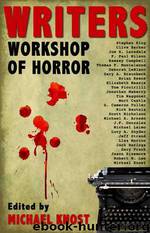Writers Workshop of Horror by Michael Knost

Author:Michael Knost [Knost, Michael]
Language: eng
Format: epub
Published: 2011-03-14T07:00:00+00:00
Finding what incites your emotions, your sense of resolve, and weaving them into motifs and sub-text can be cathartic for the author. Stephen King once said that he felt he was one of the sanest people he knew because he managed to put every frustration, anxiety and phobia he had down on the page, and in the process managed to exorcise those problems. In our fiction we can address whatever personal or social ills we perceive, whatever major arguments and questions we might have about the world. We can route out the most significant feelings and apply them time and again.
But of course, conveying the substance of this through our fiction can be a double-edged sword. There's always a chance you'll wind up on a soapbox without meaning to. There's also the possibility that you'll tend to repeat yourself, and that the subject matter itself will hamper your imagination and force issues to the forefront that aren't necessarily best for the story you're trying to tell.
So when are you going too far and why should you worry about it in the first place?
Well, you probably shouldn't. You should simply be aware of the issues that might be hidden between the lines of your work. Thematic plot threads, symbolism, and recurring motifs are simply other means to an end: making your fiction as strong as it can be.
To put a personal spin on it: My father died when I was quite young and I've explored the idea of fathers quite frequently in my writing. Father figures are either long dead, forlorn, or tragic personages. This isn't a reflection on my father so much as it has become an odd focus of my storytelling. I find value, edge, and atmosphere in investigating that area of my sensibility. That particular figure used to that particular purpose holds some resonance for me as an author, and inspires me onwards.
Religion fascinates and disturbs me, and I often impart this in my work through the subject matter. I tend to fuse elements of my Catholic upbringing with research I've done on other religions and the occult. Recurrence of this sort is to be expected throughout an author's career. We gravitate to that which enthralls us.
It's also true I have what I call my "water stories." Since I grew up on Long Island and spent a lot of time at the beach. The vastness of the ocean is a powerful concept, beneath the waves in all that darkness. It sparks a great many ideas for me, a lot of primal urges and awe and panic which I can use in my writing.
Almost everyone will find their own natural signature concepts and images that provide the themes for their work over the courses of their careers. I think it's important, though not necessary, to have something that you can use as a seal or mark to make your fiction stand out. These are underlying messages that the reader will pick up on.
Edgar Allan Poe repeatedly returned to the notion of the premature burial.
Download
This site does not store any files on its server. We only index and link to content provided by other sites. Please contact the content providers to delete copyright contents if any and email us, we'll remove relevant links or contents immediately.
Asking the Right Questions: A Guide to Critical Thinking by M. Neil Browne & Stuart M. Keeley(5765)
Autoboyography by Christina Lauren(5228)
Eat That Frog! by Brian Tracy(4527)
Dialogue by Robert McKee(4390)
Sticky Fingers by Joe Hagan(4190)
Journeys Out of the Body by Robert Monroe(3621)
Annapurna by Maurice Herzog(3464)
Full Circle by Michael Palin(3443)
Schaum's Quick Guide to Writing Great Short Stories by Margaret Lucke(3376)
Elements of Style 2017 by Richard De A'Morelli(3343)
The Art of Dramatic Writing: Its Basis in the Creative Interpretation of Human Motives by Egri Lajos(3063)
Atlas Obscura by Joshua Foer(2955)
Why I Write by George Orwell(2945)
The Fight by Norman Mailer(2930)
The Diviners by Libba Bray(2928)
In Patagonia by Bruce Chatwin(2922)
The Mental Game of Writing: How to Overcome Obstacles, Stay Creative and Productive, and Free Your Mind for Success by James Scott Bell(2906)
Venice by Jan Morris(2570)
The Elements of Style by William Strunk and E. B. White(2470)
